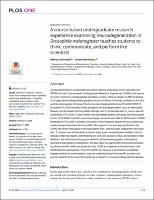Please use this identifier to cite or link to this item:
https://hdl.handle.net/20.500.12202/9935| Title: | A course-based undergraduate research experience examining neurodegeneration in Drosophila melanogaster teaches students to think, communicate, and perform like scientists |
| Authors: | Delventhal, Rebecca Steinhauer, Josefa 0000-0002-0960-5271 |
| Keywords: | DROSOPHILA melanogaster *PSYCHOLOGICAL feedback *SCIENTISTS *NEURODEGENERATION *ACTIVE learning *CENTRAL nervous system YESHIVA University |
| Issue Date: | 2020 |
| Publisher: | PLoS ONE (Public Library of Science) |
| Citation: | Delventhal, R. & Steinhauer, J. (2020). A Course-based undergraduate research experience using Drosophila melanogaster to examine neurodegeneration teaches students to think, communicate, and perform like scientists. PLoS One, 15(4), e0230912. |
| Series/Report no.: | PLoS One;15(4) |
| Abstract: | As educators strive to incorporate more active learning and inquiry-driven exercises into STEM curricula, Course-based Undergraduate Research Experiences (CUREs) are becoming more common in undergraduate laboratory courses. Here we detail a CURE developed in an upper-level undergraduate genetics course at Yeshiva University, centered on the Drosophila melanogaster ortholog of the human neurodegeneration locus PLA2G6/PARK14. Drosophila PLA2G6 mutants exhibit symptoms of neurodegeneration, such as attenuated lifespan and decreased climbing ability with age, which can be replicated by neuron-specific knockdown of PLA2G6. To ask whether the neurodegeneration phenotype could be caused by loss of PLA2G6 in specific neuronal subtypes, students used GAL4-UAS to perform RNAi knockdown of PLA2G6 in subsets of neurons in the Drosophila central nervous system and measured age-dependent climbing ability. We organized our learning objectives for the CURE into three broad goals of having students think, communicate, and perform like scientists. To assess how well students achieved these goals, we developed a detailed rubric to analyze written lab reports, administered pre- and post-course surveys, and solicited written feedback. We observed striking gains related to all three learning goals, and students reported a high degree of satisfaction. We also observed significantly improved understanding of the scientific method by students in the CURE as compared to the prior year's non-CURE genetics lab students. Thus, this CURE can serve as a template to successfully engage students in novel research, improve understanding of the scientific process, and expose students to the use of Drosophila as a model for human neurodegenerative disease. [ABSTRACT FROM AUTHOR] Copyright of PLoS ONE is the property of Public Library of Science and its content may not be copied or emailed to multiple sites or posted to a listserv without the copyright holder's express written permission. However, users may print, download, or email articles for individual use. This abstract may be abridged. No warranty is given about the accuracy of the copy. Users should refer to the original published version of the material for the full abstract. (Copyright applies to all Abstracts.) |
| Description: | Scholarly article / Open access |
| URI: | https://journals.plos.org/plosone/article?id=10.1371/journal.pone.0230912 https://hdl.handle.net/20.500.12202/9935 |
| ISSN: | 1932-6203 |
| Appears in Collections: | Stern College for Women -- Faculty Publications |
Files in This Item:
| File | Description | Size | Format | |
|---|---|---|---|---|
| Steinhauer 2020 OA A course-based undergraduate.pdf | 1.1 MB | Adobe PDF |  View/Open |
This item is licensed under a Creative Commons License

